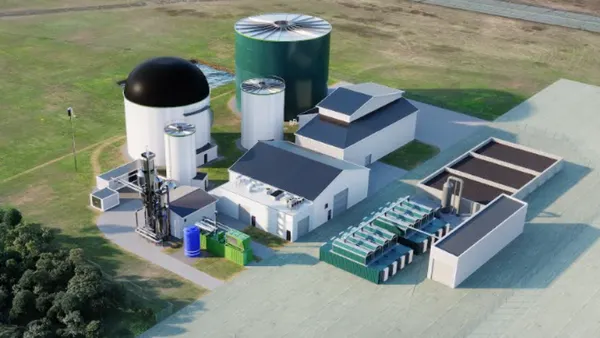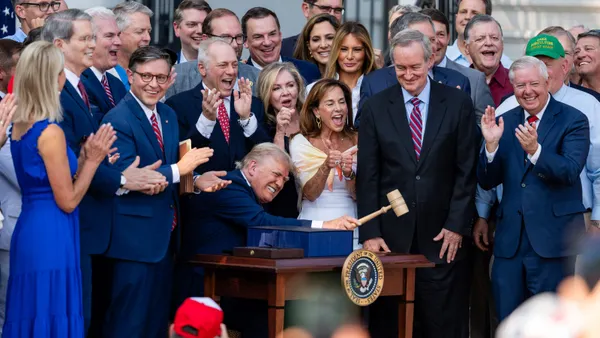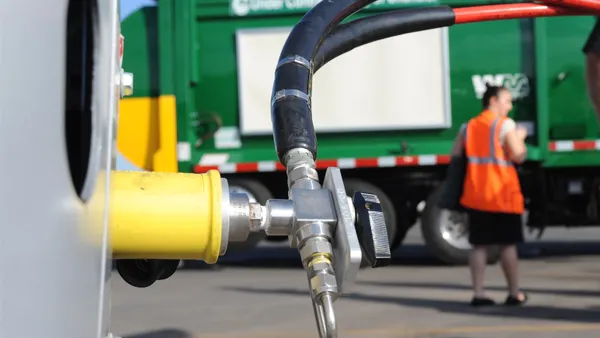2017 Earnings
| Revenue | $1.752B |
| YoY Change | 3.1%▲ |
Dive Brief:
- Covanta sold a 50% stake of its Dublin facility to the Green Investment Group (GIG) for €136 million ($167 million) which closed Feb. 12 — causing the company to begin 2018 with guidance of adjusted EBITDA between $425 million and $455 million, free cash before working capital of $100 million to $130 million, and free cash flow between $70 million and $100 million, as reported during the company's Q4 and full-year earnings call.
- CEO Steve Jones said during the earnings call that, of the 20 million tons the company processes yearly, 1 million is profiled waste, though the Fairfax, VA closure led to a down year, as reported by Seeking Alpha. With Fairfax back to being fully operational, Jones said the amount of profiled waste "should come back very strongly." Jones also said Fairfax should be a key driver of organic growth in 2018.
- Jones said the company is watching the Department of Commerce's potential for implementing further tariffs on steel and aluminum from certain countries. "Tariffs of this type would likely benefit domestic steel and aluminum prices and could improve demand for our products," Jones said. "However, the exact impact to us is highly dependent on how these recommendations are ultimately implemented."
Dive Insight:
While 2018 did begin with Covanta making a small Covanta Environmental Services (CES) acquisition in Canada, the company is not talking up new deals in the coming year. 2018 appears to be about revamping operations at the company's existing facilities and continuing projects that are already in the pipeline.
The Dublin and Fairfax facilities are both fully operational, after separate incidents kept the plants from running at full capacity for the entirety of 2017 — and based on what was said during the earnings call, Jones expects the two to be big drivers of revenue for the company in 2018, with expectation "to see over 1 million tons in improved volumes, given a full-year of Fairfax and Dublin," Jones said.
The biggest new development is Covanta's Rookery South project in the United Kingdom. The company has begun site work, with further construction expected after financial close later in 2018.
"We have a pretty strong bank group together for the Rookery project," Jones said. "We are not ... sticking around waiting for the appeal period to run. We are already moving dirt out there ... Actually three quarters of the bank group have already received credit approval."
Chief Financial Officer Brad Helgeson laid out other areas the company would be investigating to drive organic growth beyond the fully operational Fairfax and Dublin facilities.
"All the initiatives across metals, across profiled waste, ash processing, and we think that over that kind of timeframe, especially as we moved into next decade, the waste disposal dynamics in our markets, particularly in New England are going to be very, very supportive," Helgeson said.
In the Northeast United States, that growth is likely to include the development of a marine transfer station in New York City and a renewed contract in Pennsylvania to continue operating two facilities. However, Helgeson did not shy away from the possibility 2018 could include some difficult choices for the company.
"But there may be cases quite frankly in 2018 where we can’t find additional value, and we will shut plants down," he said.
Jones said the company was looking at profiled waste — such as pharmaceuticals — driven by the nationwide opioid crisis, to look for "the highest priced waste to come in, in order to do a pocket switch with waste we’re already taking."
The company will also be watching the Department of Commerce, as Secretary Wilbur Ross recommended last year the U.S. impose tighter tariffs on certain imports of steel and aluminum, and President Trump reportedly wants a 24% tariff imposed on China (though some reports say Trump actually wants a 25% tariff).
Such a move would likely drive up domestic metal prices, including for recovered metals, helping Covanta continue to drive revenue from selling recovered materials. Jones certainly did not deny the possibility.
"[President George W.] Bush did something ... believe it is back in the early 2000s and it had a big impact, I think positive impact, if you are us, on both ferrous and non-ferrous pricing," Jones said.









